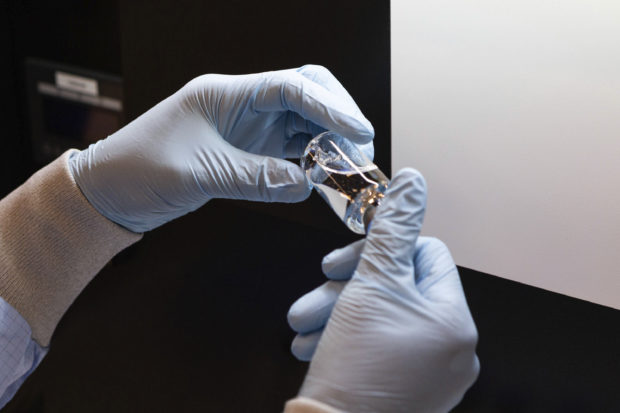Japan approves remdesivir for coronavirus treatment

In this March 2020 photo provided by Gilead Sciences, a vial of the investigational drug remdesivir is visually inspected at a Gilead manufacturing site in the United States. Given through an IV, the medication is designed to interfere with an enzyme that reproduces viral genetic material. (Gilead Sciences via AP FILE)
TOKYO — Japan on Thursday authorized the antiviral drug remdesivir to treat coronavirus patients, the government said, with an eye to approving another medication Avigan this month.
This makes Japan the second country to approve the drug after US regulators authorized it on Friday for emergency use against severe cases of COVID-19.
“Remdesivir was approved under exceptional measures,” a health, labor and welfare ministry official said.
“It was our country’s first such approval for the treatment of coronavirus patients,” the official told AFP.
Prime Minister Shinzo Abe said last week the government was getting ready to give a speedy green light to the experimental drug developed by US firm Gilead Sciences.
Article continues after this advertisementThe US go-ahead came after a major clinical trial showed remdesivir – originally developed to treat Ebola – shortened the time to recovery in some patients by a third.
Article continues after this advertisementThe difference in mortality rate was not statistically significant.
Remdesivir, which is administered by injection, was already available to some patients who enrolled in clinical trials around the world.
“The Japanese approval of remdesivir is in recognition of the urgent need to treat critically ill patients in Japan. It is a reflection of the exceptional circumstances of this pandemic,” said Merdad Parsey, chief medical officer at Gilead Sciences.
Remdesivir incorporates itself into the virus’s genome, short-circuiting its replication process.
The Gilead statement noted that clinical trials are ongoing to evaluate the safety and efficacy of remdesivir for the treatment of COVID-19.
As for Avigan, developed by Japanese firm Fujifilm Toyama Chemical, top government spokesman Yoshihide Suga said the government “aims to approve it this month” if a clinical trial involving 100 patients proves effective.
The drug, whose generic name is favipiravir, was approved for use in Japan in 2014 but only in flu outbreaks that are not being effectively addressed by existing medications.
It is not available on the market and can only be manufactured and distributed at the request of the Japanese government.
Favipiravir, which can be taken orally as a pill, works by blocking the ability of a virus to replicate inside a cell.
Avigan has been shown in animal studies to affect fetal development, meaning it is not given to pregnant women.
For more news about the novel coronavirus click here.
What you need to know about Coronavirus.
For more information on COVID-19, call the DOH Hotline: (02) 86517800 local 1149/1150.
The Inquirer Foundation supports our healthcare frontliners and is still accepting cash donations to be deposited at Banco de Oro (BDO) current account #007960018860 or donate through PayMaya using this link.